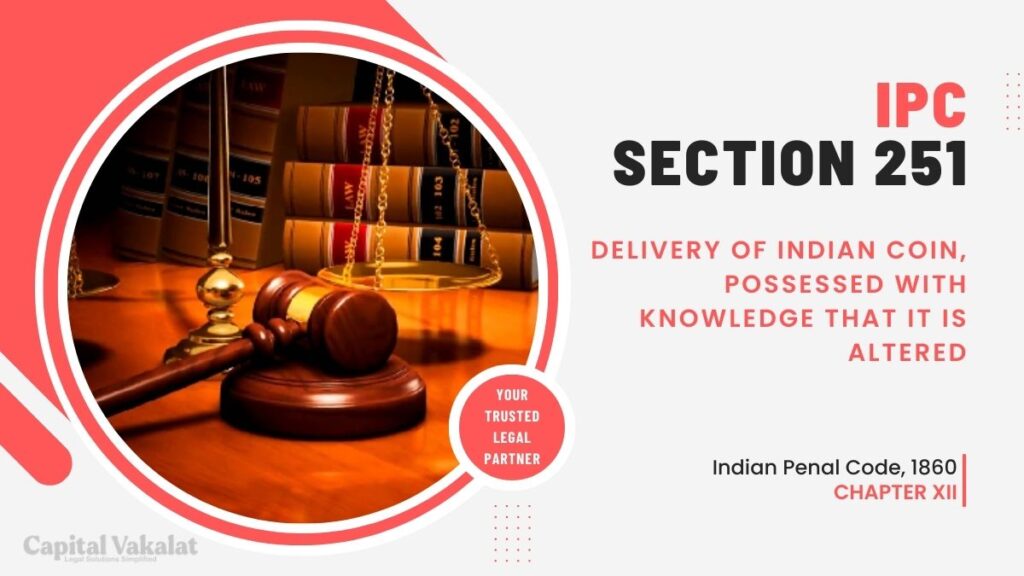In the vast realm of Indian penal laws, Section 251 IPC (Indian Penal Code) deals with a specific offense that involves the delivery of Indian coins with the knowledge that they have been altered. This article will dive into the nuances of this particular section, its legal implications, and the various elements that constitute the offense. We will explore the importance of establishing knowledge of alteration, the penalties associated with the offense, and provide a comprehensive understanding of recent cases and challenges in its prosecution.

Finally, we’ll discuss preventive measures and reporting, shedding light on the significance of upholding the integrity of Indian currency.
Introduction to Section 251 IPC
Section 251 of the Indian Penal Code (IPC) addresses a unique aspect of coin-related offenses. It pertains to the delivery of Indian coins, an action that becomes an offense when performed with the knowledge that the coins have been altered. This section plays a vital role in safeguarding the authenticity and trustworthiness of Indian currency, as altered coins can disrupt the financial system and cause significant economic repercussions.
Understanding the Offense of Delivering Altered Indian Coins
The core of this offense lies in the act of delivering Indian coins. However, what distinguishes this act from ordinary coin exchange is the crucial element of knowledge. To fully comprehend this offense, it is essential to understand the legal provisions that govern it.
Legal Provisions Under Section 251 IPC
Section 251 IPC, titled “Delivery of Indian coin, possessed with knowledge that it is altered,” is an essential component of the Indian Penal Code. It outlines the offense and its consequences. To be convicted under this section, several key elements must be established.
Elements of the Offense
To prosecute an individual under Section 251 IPC, the following elements must be proven:
- Delivery of Indian Coins: The accused must have delivered Indian coins.
- Knowledge of Alteration: The prosecution must establish that the accused possessed knowledge that these coins were altered.
Proving Knowledge of Alteration
Establishing the accused’s knowledge of coin alteration can be a challenging task for the prosecution. The burden of proof lies in demonstrating that the accused had not only handled these coins but was aware of their altered state. This requirement is crucial to differentiate innocent transactions from criminal acts.
Punishments and Penalties
Section 251 IPC prescribes penalties for those found guilty of delivering altered Indian coins. The severity of the punishment may vary based on the circumstances of the case, and the court’s discretion. Penalties can range from fines to imprisonment, depending on the gravity of the offense.
Recent Cases and Precedents
To better understand how Section 251 IPC is applied in real-world scenarios, it is helpful to examine recent cases and legal precedents. These cases shed light on the judicial interpretation and the challenges faced by the legal system when dealing with coin alteration offenses.
Challenges in Prosecution
Proving the accused’s knowledge of coin alteration presents a significant challenge in the prosecution of Section 251 IPC cases. The article explores the intricacies involved in building a strong case, including the need for circumstantial evidence, witnesses, and expert opinions.
Preventive Measures and Reporting
To prevent the circulation of altered Indian coins, it is crucial for individuals, businesses, and financial institutions to be vigilant. Reporting suspicions of altered coins is a civic responsibility, and this section covers the steps and measures that can be taken to uphold the integrity of Indian currency.
Conclusion
In conclusion, Section 251 IPC serves as a deterrent against the delivery of Indian coins with knowledge of their alteration, thereby protecting the integrity of India’s financial system. It is essential to understand the legal provisions, the burden of proving knowledge of alteration, and the associated penalties. Upholding the sanctity of Indian currency is a collective responsibility, and awareness of this provision is vital in achieving that goal.
Frequently Asked Questions
How is knowledge of coin alteration established in court?
Proving knowledge of coin alteration often requires circumstantial evidence, witness testimonies, and expert opinions to convince the court.
Can delivering altered coins lead to imprisonment under Section 251 IPC?
Yes, depending on the gravity of the offense, delivering altered Indian coins can lead to imprisonment along with fines.
Are there any recent landmark cases related to Section 251 IPC?
The article discusses recent cases and precedents to provide insights into the application of this section in the legal context.
What can individuals and businesses do to prevent the circulation of altered Indian coins?
Vigilance and prompt reporting of suspicions regarding altered coins are essential steps to prevent their circulation and protect the integrity of Indian currency.